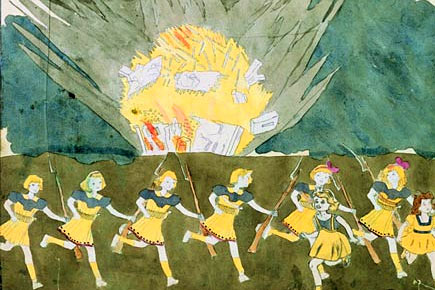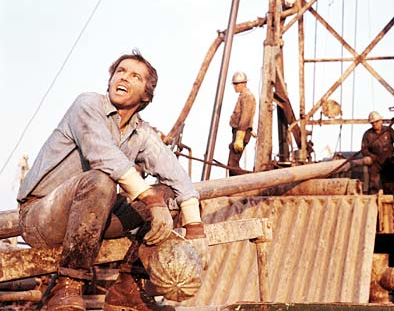
This novel— an episodic mélange of prose, stream of consciousness, poetry, correspondence, and theatrical dialogue— is about one man’s quest for identity by means of love, work, and philosophy. This patchwork technique Fitzgerald employs is called “modernistic” by its defenders since it defies accepted conventions of structure. But it is because of careful structuring that we become emotionally involved in fiction; otherwise we forget the point of the reading and in this day of diminished attention spans, language alone may not be enough to guarantee the commitment of the reader. Thus, the precarious existence of This Side of Paradise today: it is famous for making Fitzgerald famous rather than for the work itself.
Interestingly enough, rather than feeling it was written by Fitzgerald it has the atmosphere of several writers—the writing has Wilde’s pithy wittiness, Waugh’s schoolboy sentimentalism, Joyce’s philosophical diatribes, even Sinclair Lewis’s radicalism, held together by Fitzgerald’s mischievous turn of phrase.
The story hinges on a hypothesis posited to Amory at a young and impressionable age. Every apprentice philosopher has his mentor and Amory’s is in the Catholic Church, described thus:
“Monsignor was 44 then, and bustling— a trifle too stout for symmetry… When he came into a room clad in his full purple regalia he resembled a Turner sunset and attracted both admiration and attention… He was intensely ritualistic, startlingly dramatic, loved the idea of God enough to be a celibate, and rather liked his neighbor.”
Although he doesn’t share his faith in the Church, The Monsignor is Amory’s intellectual hero. He is put to quest, Candidelike, when the Monsignor describes the difference between a personality and a personage and why the latter is most preferable:
“Personality is a physical matter almost entirely; it lowers the people it acts on—Now a personage, on the other hand, gathers. He is never apart from what he’s done… When you feel that your garnered prestige and talents and all that are hung out, you need not bother about anybody.”
It’s rather pretty, delicate, and incoherent but enough for Fitzgerald, at least, to build a novel on. The idea is put to the test at Princeton among the co-eds where Amory encounters a variety of “personalities,” that Fitzgerald doesn’t develop well enough to constitute a “personage.” In the case of Amory Blaine, his own lack of something substantial beyond the realm of ideas fails him at work, play, and love.
When a crisis is absent in a novel, it’s critical that we sympathize with the character. It’s not always easy getting along with Amory Blaine. He’s middle class middle American trying to make it in Princeton and New York in the late teens, early 1920s, a time just after what was then known as The Great War, when opportunities were opening up for ambitious young men. He runs with a literary set in college, writes poetry, falls in love. He is a thoroughly self-conscious individual, sensitive to class and caste and as his fortunes fail, feels acutely dissatisfied that he should be so powerless in spite of his rhetorical flair.
Never is this clearer than when he loses his love interest, Rosalind. Although this young debutante loves Amory’s wit and her chemistry with him is superb to all suitors she cannot commit to some advertising copywriter earning just $35 a week no matter how much potential there is in his pipe dreams. In other words, she willfully chooses money over love. Fitzgerald is at his most delightful when describing his characters and he has fun detailing Rosalind:
“She is quite unprincipled; her philosophy is carpe diem for herself and laissez-faire for others. She loves shocking stories: she has that coarse streak that usually goes with natures that are both fine and big. She wants people to like her but if they do not it never worries or changes her.”
This is beautiful stuff. He may as well be describing America itself but it’s supposedly based on Zelda Sayre, the Zelda, famous of all flappers, from which Fitzgerald was drawing inspiration. This Side of Paradise was cobbled together with an earlier draft of a novel called The Romantic Egotist, as well as unpublished poetry and scraps of prose diary entries—his and Zelda’s— in order to compose a salable novel that might win her favor. It’s no wonder that this was the same guy who could come up with Jay Gatsby, Daisy Buchanan, and the fashionable parties of West Egg.
Its flaws aside, This Side of Paradise, can be enjoyed for the insight it yields into a great American writer. Rosalind could be describing the Fitzgeralds’ untold future when she laments, “I suppose all great happiness is a little sad. Beauty means the scent of roses and then the death of roses.” Amory goes on a self-destructive two-week alcoholic binge once she breaks things off for good, an incoherent, solipsistic misadventure; the kind that Fitzgerald would become notorious for. “To hold a man a woman has to appeal to the worst in him,” Amory muses on the Atlantic City boardwalk, a line of thought that excuses our worst excesses in the name of love.
In a series of reversals, both self-inflicted and the fated kind, Amory has received his comeuppance, but in becoming a wandering, lovelorn derelict, he discovers his artistic sensibility and what it means not only to be a man, but a personage: "He found something that he wanted, had always wanted and always would want— not to be admired, as he had feared; not to be loved, as he had made himself believe; but to be necessary to people, to be indispensable.”
As a truism to live by, it’s as good as any, but worth the effort of the modern reader when there is so much tempting us? This Side of Paradise is too episodic to be a great novel; and any book that climaxes with a debate regarding the merits of socialism betrays its literary value as well as its narrative truancy. But there are many fashions in which to consider art. It must have been exciting when this declaration of intent was published with its pretensions towards power, greatness and wealth, signed by ambition. This Side of Paradise sold through its first printing quickly, earned the praise of H. L. Mencken, and put F. Scott on the map for good. And though his more famous novels are associated with the Jazz Age, it's this early effort that more clearly attempts to speak for his generation’s dissatisfaction with contemporary American life as they were finding it and ready-set to change it. It begins with recognition from within: “I know myself… But that is all,” so goes the novel’s famous last words and they tell all.
If it took writing the novel to get the girl, getting the girl meant, eventually, The Great Gatsby. As far as very public love letters and tell-all memoirs disguised as literature, this means the whole damn enterprise was well worth it.










